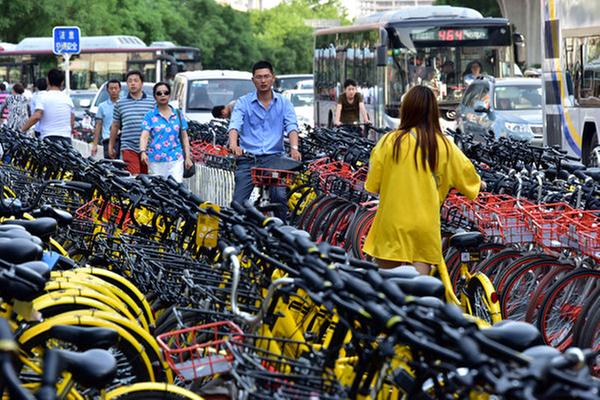Sharing economy gets lift

|

|
| Shared bikes in Beijing, above, are becoming more common. From top right, shared basketballs are available at a park in Jiaxing, Zhejiang province. ZHANG KE/ FOR CHINA DAILY |
Li, State Council draft guidelines to encourage innovation in burgeoning sector
A guideline to further boost China's sharing economy was approved on Wednesday at a State Council executive meeting chaired by Premier Li Keqiang.
Under the guideline, the growing sector will have easier access, greater policy transparency and better protection of legitimate rights for platform companies, resource providers and consumers. The guideline is aimed at creating an environment that enables and sustains innovation.
"We should give credit to the sharing economy as a reinvigorating force in China's economic growth," Li said.
The sharing economy includes areas such as bicycle-sharing services, car hailing services and even shared basketballs and phone chargers.
"The country's sharing economy, enabled by the Internet Plus, has been instrumental in absorbing excess capacity and creating new jobs through its various new business models," Li said.
China's sharing economy is likely to sustain 40 percent annual growth momentum in the coming years, according to a February report by the State Information Center and the Internet Society of China.
According to the report, the market turnover of the country's sharing economy in 2016 reached 3.45 trillion yuan ($505.4 billion), up 103 percent year-on-year.
In 2016, the sharing economy served about 600 million people in China. There were 5.85 million people who were on the payroll of sharing economy platforms, 850,000 more than in 2015, it said.
"The regulation of the sharing economy should be tolerant while prudent, as there is still much yet to be learned about new business models," Li said. "We should avoid simply applying traditional methodology on the sharing economy."
Going forward, authorities are being tasked with improving public services in terms of data sharing, government service procurement, urban planning and resources management innovation, the guideline said.
Financial institutions are being encouraged to provide innovative financial services and products tailored to the demand of companies in the sector.
The government also will get creative with taxation and other measures to facilitate the sector's growth, especially in creating new jobs.
Companies with cutting edge products are being encouraged to go global, establish their presences and build brand names.
However, companies that improperly manage their businesses — including illegally disclosing or abusing the personal information of consumers and illegally competing in the market — will face the full weight of law, the State Council decided.
"China is a country vast in size and with diversified demands, still industrializing and urbanizing. There are a lot of resources and capacities that could be put to better uses," Li said.
"Government at different levels should take the initiative with the big picture in mind, striking a balance between 'enabling' regulation and risk preparedness, in our effort to build a level playing field for all to compete and excel."
According to the February report, the sharing economy has covered areas such as transportation, housing, medical services and manufacturing. Its integration with the real economy has been accelerated, as the sharing model helps eliminate outdated production capacities, expand effective supplies and move traditional industries to high-end industries, the report said.
Contact the writers at [email protected]
- Big lottery winners in Guangzhou claim prize
- No indication of big earthquake to occur in Ningxia, said officials
- Rural China tackles hefty bride prices to ease marriage burdens
- 8 killed, 15 injured in market fire in North China's Hebei
- 'Ferryman of souls' escorts cremains of veterans from Taiwan to mainland home
- China announces month-long online shopping event for Spring Festival





































